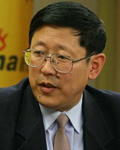| 
Among world leaders, Japanese Prime Minister Shinzo Abe is unparalleled in making headlines for the wrong reasons.
Since he became Japan's leader for the second time, Abe has more than once come under fire because of his controversial comments, one of which was his remark that the definition of "aggression" has yet to be established in the international community or academia. His publicity stunts, from wearing a camouflage jacket and helmet waving from a tank to posing inside a training jet emblazoned with the number "731", a reminder of the imperial Japanese army's notorious Unit 731 that conducted horrific human experiments during World War II, have also been widely condemned.
But it was his year-end visit to the controversial Yasukuni Shrine that honors 14 Class-A war criminals that proved his words and acts could not be taken in anything but a militarist way.
Japan's war crimes are beyond dispute. During the Tokyo war crime trials (1946-48), groups of major political and military leaders in Japan were indicted on 55 counts of "crimes against peace", "conventional war crimes", and "crimes against humanity", among which Class-A charges were brought against Japan's top leaders who had plotted and organized crimes against peace.
After the end of WWII, former prime minister Nobusuke Kishi was at the forefront of those encouraging revisionism and he even dedicated a headstone to seven war criminals executed after the Tokyo trials honoring them as "patriots who died for their country". Coming from the Kishi family, Abe has stepped into his maternal grandfather's shoes and has now gone even further down the revisionist path, claiming that the Tokyo Trials were merely "victor's justice" and the Japanese wartime leaders charged with Class-A war crimes are "not war criminals under Japan's laws".
The truth is that even if Abe acknowledged the verdicts of the Tokyo Trials, it would not be enough, as most of the court battles centered on substantiating the crimes against peace charges, with the crimes against humanity a lower-profile part of the trials.
(Source: China Daily) | 